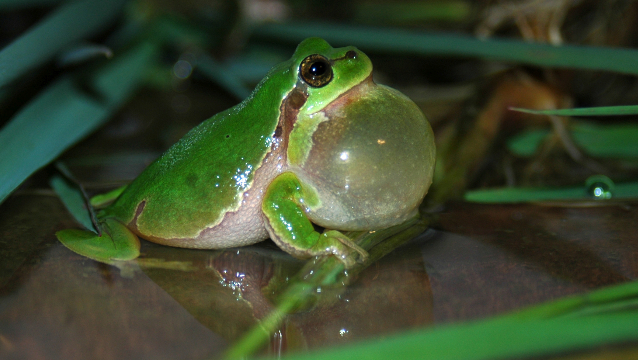 Hyla arboreaCOURTESY OF THIERRY LENGAGNEIf you’ve ever lived near a busy road, you’re familiar with the noise of cars whooshing by and ear-piercing honks. Traffic noise is a well-known source of stress in humans. Now, a team of researchers has found that it can cause increased stress levels in frogs too. And aside from a spike in stress, traffic noise can have other negative effects on the European tree frog (Hyla arborea), such as suppressed immunity and a dulling of males’ vocal sacs. The team’s results were published last week (January 11) in Conservation Biology.
Hyla arboreaCOURTESY OF THIERRY LENGAGNEIf you’ve ever lived near a busy road, you’re familiar with the noise of cars whooshing by and ear-piercing honks. Traffic noise is a well-known source of stress in humans. Now, a team of researchers has found that it can cause increased stress levels in frogs too. And aside from a spike in stress, traffic noise can have other negative effects on the European tree frog (Hyla arborea), such as suppressed immunity and a dulling of males’ vocal sacs. The team’s results were published last week (January 11) in Conservation Biology.
To study the effects of road noise on frogs, Thierry Lengagne of the University of Lyon and the French National Center for Scientific Research (CNRS) and colleagues first recorded noise from a nearby high-traffic road. The scientists then played back the recording to 20 male frogs in the lab. After 10 days of 24/7 exposure to traffic noise at 76 decibels, the frogs showed signs of increased stress.
To quantify the amphibians’ stress, Lengagne’s team measured levels of the hormone corticosterone in frog saliva samples. Corticosterone levels increased from an average of 3.2 picogram (pg) per milligram (mg) of saliva at the start of the experiment to 5.06 pg per mg at the end of it—an increase of 58 percent.
Weakened immunity was another consequence ...



















